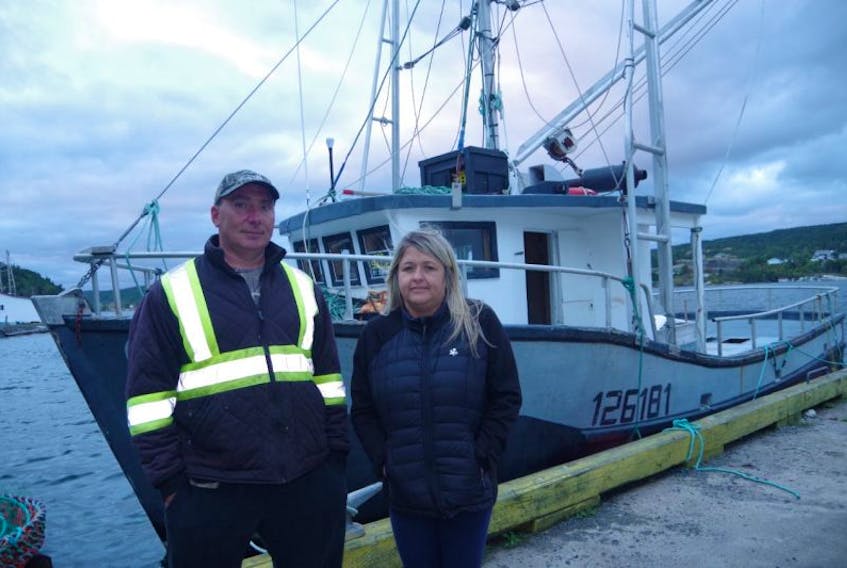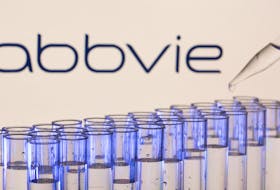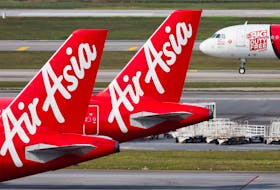How many people are considered “sufficient number of crew members” for a herring-fishing boat?
It was a question that officials of the Department of Fisheries and Oceans (DFO) in Clarenville were unable to answer.
Marsh was prompted to ask the question after she read the conditions attached to her partner Richard Marsh’s herring licence, and realized a new rule had been added since the spring herring fishery. And that new rule, in her mind, did not make sense.
The new rule stated that to be considered fully geared up for the herring fishery, the enterprise must have “sufficient number of crew members to set and retrieve this gear type.”
She went to the Clarenville office of DFO last Wednesday asking an official there to explain, precisely, how many crew members make a sufficient number.
All she got was a vague answer, Marsh told the Packet.
And a clear-cut answer was important, not just for her enterprise, but for other herring fishers, for several reasons.
The herring fishery is a ‘load and go’ fishery.
A quota is set for each bay, and fishers who are licenced catch herring in each designated fishing zone fish until the quota for the bay is caught.
Unlike the crab or cod fisheries — where each enterprise has its own individual quota allowing them to plan fishing trips — the herring fishery operates like a first-come, first-served scenario.
Having a good herring fishing season usually comes down to luck — in finding the fish, trapping it, and praying against bad weather and mechanical breakdowns that might take you off the water.
It also helps to team up with another fishing enterprise.
As he did in the Spring herring fishery, Richard Marsh had planned to team up with his brother, Jim, for the Fall fishery.
Jim Marsh also has his own herring licence, boat and gear.
In the herring fishery, teaming up works like this.
Herring is a fish best caught at night, using high-powered lights on the deck of a boat to draw the fish.
Herring are attracted to bright lights and huge schools of them will swim around the well-lit vessel.
Working as a team, the first boat will keep the high-powered deck lights on, to sit on the school of herring — holding the fish in place, so to speak — while the second boat sets a ‘tuck’ seine around the first boat to capture the fish.
As the ropes on the seine are drawn up through the power block — a pulley powered by hydraulics — the herring are captured.
Then both boats can load up from the seine.
Of course, fishers must follow another DFO rule — Licence Conditions 4. 3(b) — that “You shall not share fish with another vessel(s), unless: …. The fish is excess that remain entrapped after the vessel that set the fishing gear has been fully loaded.”
This condition has been in place for many years, and the Marsh’s fully understand and have no issue with that rule.
Until the Fall herring conditions arrived via e-mail, Richard and Jim Marsh had planned to fish the Fall herring fishery the same way they fished in the Spring, teaming up with each other to share the work and crewmembers, and ensure a good season for all hands.
Melanie says it’s essentially the same as two businesses working together for the benefit of both.
“For the herring fishery, we’d use five or six crew members between the two boats,” she explains. “They’d work together on catching the herring and, once the boats are loaded with herring, half the crew members will go to port on one boat and the others will return to port on the other boat.
“Once you have the herring tucked up and loaded, the biggest part of the work is done. Then it’s back to the wharf to unload.”
The regulation about “sufficient crew” and the vague answer from the DFO officials in Clarenville did not sit well with Melanie.
Fishing is a business, she says.
As the partner of a fisherman she handles all the paperwork and management of the fishing business.
She doesn’t fish on the boat; instead she works a full-time, year-round day job in nearby Clarenville.
Nights and weekends she attends to the paperwork of running a fishing business.
“And as far as I’m concerned this rule was DFO dictating to us how to run our business. It would be the same as government telling any other business it had to employ a ‘sufficient’ number of people to run their business,” she told the Packet.
So she was prepared to fight back on this one.
After contacting the Packet on Wednesday, she also contacted the Fish, Food and Allied Workers (FFAW) union and managers further up the chain in DFO.
The Packet also contacted DFO last Thursday, asking for the rationale and purpose behind the licence condition change.
An official from the department was not available to speak on the issue, but after a few phone calls and emails exchanged, a public relations official informed the Packet on Friday morning that new licence conditions for the herring fishery were being reviewed.
At 10:14 p.m. Friday night, Richard Marsh had his new licence conditions via email.
The rule about “sufficient crew” was deleted.
The Marsh’s are pleased; they can now fish for herring this Fall the same way they fished in the Spring, and make their own decision about the number of crewmembers to use.
For the record, in its reply to the Packet’s request for an explanation for the “sufficient crewmembers” rule, DFO in St. John’s replied on Friday morning, “The Department introduced a new licence condition in response to industry concerns about a practice known of ‘barging,’ whereby vessels that are not geared up for a fishery retrieve catch from an active enterprise. As a result, participation in the fall herring fishery is restricted to those geared-up for active fishing.
“We recognize that the reference to ‘sufficient crew’ in the licence conditions related to the ‘barging’ issue has caused some confusion. We are working with industry to clarify the requirements and harvesters are receiving amended licence conditions today via the National Online Licensing System.”
The Packet also contacted the FFAW last week, and their response was, “We spoke with DFO and while we will not be commenting on the change, DFO plans to release an explanation on why the condition was put in place.”
Melanie Marsh, meanwhile, is glad she spoke up on this issue.
She only wishes more fishers would do the same when they come up against regulations that hinder their ability to run an efficient business enterprise.
“This is our livelihood, and if we don’t fight for it then who’s going to?” she said the day after receiving the new licence conditions.









